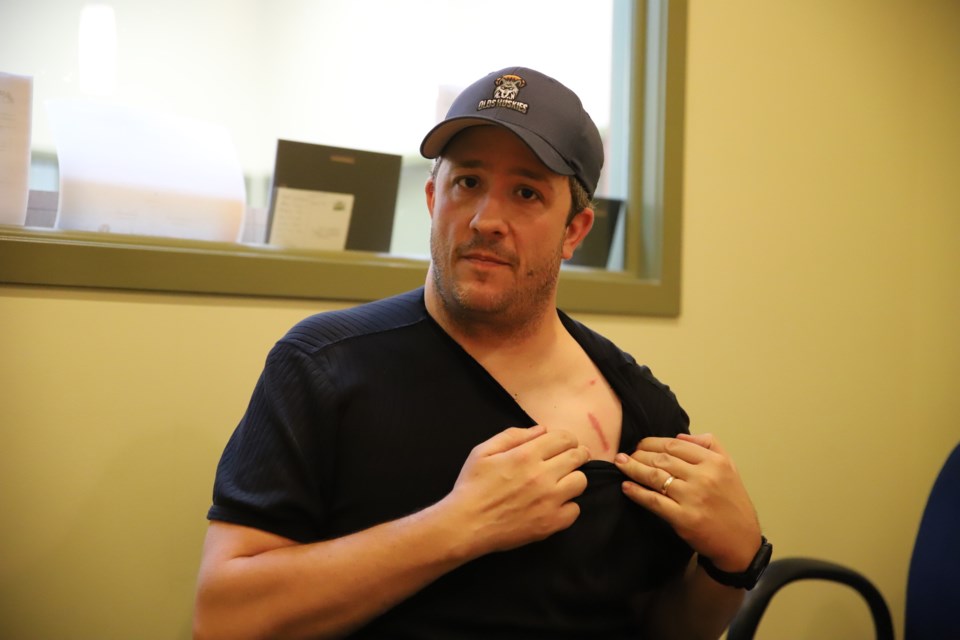OLDS — Peewee Huskies football head coach Dennis Yurchevich plans to keep on coaching this season, despite suffering a cardiac arrest and having a pacemaker/defibrillator implanted in his chest after a game late last fall.
However, he is making one concession: he will no longer serve as the bantam Bulldogs head coach as well.
Yurchevich, 46, made that announcement during an interview with the Albertan.
“Our registration is going to open March 1, from what I understand and then I’m hoping in April or May to start a spring camp,” he said.
Three members of the Olds Amateur Football Association – members of two selects football squads in the province have been invited to compete in an international football tournament in Texas which runs Feb. 24-26.
Yurchevich does not plan to attend that tournament in person, but does plan to follow it online.
The cardiac arrest occurred at a minor football game Oct. 29, last year.
“My heart stopped, I quit breathing and collapsed right there on the field,” Yurchevich recalled.
Fortunately for him, an on-field medic for the day from Sundre was on hand, as were several Olds firefighters who had kids enrolled in the program.
Also on hand was Olds Fire Department Chief Justin Andrew who had just returned from a call and had an automated external defibrillator (AED) in the back seat of his vehicle.
AEDs deliver an electric shock to the heart to get it going again and in a normal rhythm after a cardiac arrest.
“They shocked me once and that brought me back and they loaded me into the ambulance, rushed me down to the Foothills hospital (in Calgary),” Yurchevich said.
On Nov. 4, surgeons implanted a defibrillator with a pacemaker in it in his chest and he was eventually back home.
Did Yurchevich stay home?
Nope. He travelled to Lethbridge with the bantam Bulldogs for a Nov. 12 nine-man league championship game versus the Jr. Coyotes which the Bulldogs won 43-42.
“I didn’t coach. I was just on the sidelines, hanging out with the kids and the coaches,” he said, admitting it was a very, very nail-biting game.“
A couple of weeks ago, Yurchevich saw a doctor for a follow-up appointment.
That’s when he discovered that “for a 52-minute period just shortly after the game ended, my heart rate was between 275 and 300 beats a minute. This had started the countdown timer. It was almost ready to shock me.”
According to the MedicalNewsToday website, the average maximum heart rate for men age 60-65 is 155 to 160 beats per minute.
In light of how fast his heart had been beating during that championship game, Yurchevich was asked if he felt any symptoms, like shortness of breath.
“Honestly, all I felt was the adrenaline and the excitement from winning the provincial championship,” he said in an email.
“It felt no different health-wise, to be completely honest with you.
“If it wasn't for seeing the digital display from that day, I would have had no idea that I was that close to my device shocking me.
“It's certainly made me settle down and re-evaluate things. I don't want that to happen again.”
But it’s not the first time Yurchevich has had heart trouble or health issues.
On May 10, 2020 (Mother’s Day that year) Yurchevich suffered a NSTEMI (a type of heart attack that usually happens when your heart's need for oxygen can't be met).
“It’s similar to a heart attack. I had that at work in Fort McMurray,” he said.
Then he passed out three times in the morning of Oct. 17 last year. His wife drove him to Olds Hospital and Care Centre and from there, he was rushed by ambulance to hospital in Red Deer.
“They immediately hooked me up to the crash cart and they started pacing me until the ambulance showed up.”
He was fitted with a temporary pacemaker and seemed to be OK until the cardiac arrest occurred later that month.
As a result of his experience, Yurchevich sees a link between himself and Buffalo Bills safety Damar Hamlin, who suffered a cardiac arrest on Jan. 2 after making a tackle during an NFL football game.
Hamlin was revived on the field via cardiopulmonary resuscitation and an AED.
“Honestly, watching what happened to Damar brought me to tears,” Yurchevich wrote in an email.
"It was one of the hardest things I've ever watched. That night and the next day, my phone rang non-stop from parents and players checking on me and talking about their experiences witnessing me go through the same thing.
“I'm just glad we're both OK and both here to tell our stories.”



